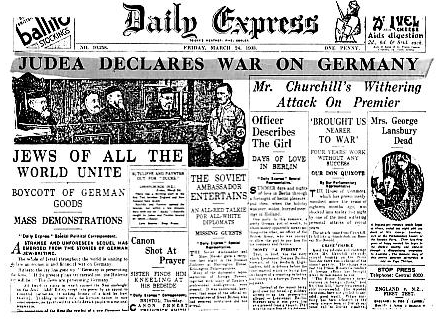
[Image] gJudea Declares War On Germanyh headline in the Daily Express
Note: this image is not in the original booklet)
Published: 1973-01-01
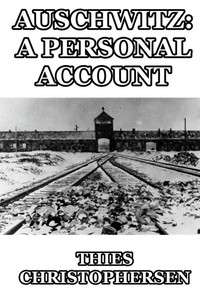
Buy this book from Amazon.com (USA) or Amazon.co.uk (UK)
Attorney-at-Law
First published in German in 1973 under the title Die Auschwitz-Lüge
More than 100,000 copies in five languages distributed!
First English edition 1974 under the title The Auschwitz Lie
Completely revised and supplemented new edition, August 1979
by Manfred Roeder, eAttorney-at-Law'
gFor God's sake, can't you carry on with your fight against pornography and moral degeneration without getting tied up in politics. Why are you so concerned about the past. Surely, you don't want to justify National Socialism or deny the crimes of the past?h Even very good friends made such imploring appeals to me after I had mentioned the word Auschwitz in connection with horror propaganda for the first time. An honestly concerned priest wrote to me, hI have to tell you that your turning to political right-wing radicalism has frightened me a little, but I will stand behind you also in future, because I know you.h
As pleased as I was about the confidence, it was alarming to realize how every effort to find truth and justice for Germany is termed: political right-wing radicalism. Yes, how much I would like to let the past rest if there was a mutual promise from all sides to forgive and forget as it was done in the peace treaty after the Thirty Years War in 1648. Nothing was to be touched upon, no persecutions were to be held. This was indeed a heroic achievement of dignity in the spirit of Christ!
What do we see today? Who is willing to forgive, to forget and heal old wounds? Only the Germans, and especially German refugees, have offered their intentions again and again, supported by deeds. What does the other side do?
The government of the German Reich was illegally removed from office. German officers, who had done nothing but their duty, and whose characters were far superior to those of the Allies passing judgment on them, were sadistically strangled, whilst no single soldier or partisan of the enemy was brought into court for war crimes. German jurisdiction and search for truth was made impossible. Only the victors were to sit in judgment and to write history. The persecution of war crimes in any other country was promptly prohibited. Not only were alleged deeds of Germans prosecuted in a most brutal manner, without consideration for any international legal principle, but it was explicitly ordered to lift the Statute of Limitations for so-called German war crimes or genocide. The Germans, thus being marked as outlaws as a result, can now have revenge taken on them until doomsday. This way, insidious partisans became national heroes; honorable German officers who defended themselves against these scroundrels were called war criminals.
The present government of the German Federal Republic has ordered a 14-volume documentation concerning crimes committed on German prisoners of war and civilians-not to be published, but to be pulped.
Golda Meir, as prime minister of Israel, made it known in unmistakable terms that gcompletely normal relations between Germany and Israelh would never exist. How can a past be left alone which is stirred up anew daily to be used against our people?
All schools continue to spread the lies about atrocities in concentration camps. There is, for instance, at this very moment an exhibition being shown in Wiesbaden under the patronage of the prime minister of Hesse, which is titled gConcentration Camp Sachsenhausen,h where all the long-disproved propaganda lies are brought up again. As class after class is being channeled through the exhibition, the horrified children read that a gas chamber was built in Sachsenhausen in 1943, although it has been proved long since that there have never existed any gas chambers on German territory. It causes one to shudder when you read, gDay and night the sweetish smell of burnt human flesh was hanging over the camp.h Such statements are being made in spite of the fact that the international Red Cross regularly inspected the concentration camps up to March 1945, and never reported on any gassing or cremating facilities or the sweetish smell.
It is further maintained that every SS-Man in Sachsenhausen had the erighte to beat up and even kill a prisoner during roll call. Of course, cruelty occurred occasionally, but almost entirely between inmates themselves or were committed by auxiliary guards, the so-called eKapos.e If an SS-Man or any other German official committed any crime against prisoners or touched their property, he was immediately court-martialed.
What possible interest could Prime Minister Osswald of Hesse have in spreading such lies about Germany?
Our entire school youth is being poisoned with these lies about their fathers to deepen the hatred between generations ever more. But this is the recipe of the world conspirators to destroy a people. And we who know better, should we keep silent? One who then still wants to tell us that this is the Christian thing to do, is in my eyes nothing but a worthless coward and scoundrel.
The Minister of Education in Hesse has commissioned the Jewess Hannah Vogt to write a book about Germany's past entitled Guilt or Destiny, which already had its 11th printing, and is distributed to all high school graduates. A Jewess will hardly be qualified to judge Germany's past objectively. This book turned out to be an absolute masterpiece of historical smear and hate propaganda in a scientific cloak, and can be put on a par with the works of the Komintern agent, Willy Muenzenberg, the unsurpassed master of anti-German agitation and lie propaganda who would shout to his collaborators, when they wrote an article against Germany:
gToo weak, too objective! Knock them on the head. Make the world stand aghast with horror. Make them the stench of the world. All men must curse them and shudder with horror!h
There is not one authentic document in existence which places the overall losses of the Jewish population during the last war higher than 200,000. During one single night, in Dresden, more defenseless, innocent Germans perished-children, women, old people and especially wounded men than Jews have died in all the concentration camps in the years of the National Socialist Regime!!! And in these Jewish total losses even natural deaths are included. Thus the losses, taken as a percentage and absolutely, are much below those of any other power taking part in the war; keeping in mind that the Jewish world organizations had already in 1933 declared a holy war on Germany to be fought to the death.

[Image] gJudea Declares War On Germanyh headline in the Daily Express
Note: this image is not in the original booklet)
At that time not a single hair on a Jew's head had been touched! Yet, the world resounds with the clamour for the dead Jews. But no outrage is voiced about Dresden and the genuine figure of six million murdered East Germans. No voice is raised about the millions of murdered German and European war prisoners who had fought on the German side. No plaque tells us of the 105,000 Frenchmen who were murdered because they were pro-German. No days of remembrance are held for the Dutch, Danes, Belgians, Norwegians, Rumanians, Russians, Cossacks, Ukrainians, who were slaughtered in a most bestial manner for having worked or fought on the German side. They wanted to save Europe from Bolshevism or, in some cases, German control was probably considered to be the lesser evil.
An employee of the present German Postal Service can be dismissed on the spot if he denies that Jews were gassed. This strange concept of ejusticee was supported by a court in Hesse which agreed that no employer needs to tolerate such utterances against Jews, which gcannot be surpassed in their offensiveness.h Every scoundrel though may freely boast today that he committed sabotage and treason against Germany.
One of the concerned readers asked me if I were not perhaps falling victim to a new kind of Anti-Semitism? On the contrary! I like to see the Jews being treated the same as everybody else and not enjoy special privileges. These privileges, and the lies spread by certain Jewish World Domination Cliques are the cause of a new Anti-Semitism. Mr. Wiesenthal promotes more Anti-Semitism than I do. Every decent Jew will welcome our search for truth and therefore agree with this brochure. By publishing this sensational report we do not stir up nationalism or hatred, but merely serve the truth, and only the truth will make us and others free. Only injustice which was really committed can be made good or forgiven. Invented eatrocity' stories will create new hatred and sow seeds of discontent without fail.
We are not so much interested here in running up and down the scale of losses and crimes, but first of all we are concerned about the spiritual recovery of our people. We have been accused of the worst crimes in the history of mankind: namely to have willingly started a global war, to have murdered millions of innocent people, and if we had had the time and opportunity, we would have eliminated also the rest of all esubjugated' peoples.
One who can accept such an accusation without protest has neither heart nor brains! Now suddenly there are witnesses who stand up and say: All this is not true! Germany neither wanted nor started this war but has been forced into it by her deadly enemies. Hitler had no intentions to kill Jews and never has he given any orders for their extermination nor for the destruction of any other peoples. There were no gas chambers. All these are the inventions of morbid brains. Nearly all of the so-called war crimes and concentration camp trials have been held with perjured witnesses and falsified documents.
Any person who is accused of a crime will certainly be pleased when he is found not guilty, all the more so if it was proved that the crime in question had not even been committed.
We Germans should, therefore, rejoice when today witnesses do appear who can prove that Auschwitz was no death machinery, but an enormous armament factory and that the inmates of the camp were on the whole treated decently, and that any people from outside could visit the camp at any time. Most of our people react quite differently though. They behave as if one wanted to deprive them of their most precious post-war experience-their guilt complex. With claws and teeth they hang on to a German guilt. This is quite a unique phenomenon in the history of mankind. In any other people such a reaction would be unthinkable and can only be described as a deep mental disturbance, as it is not normal that someone should insist on being guilty.
This is the real problem and the true reason for the publication of this brochure. It is not a question of which side has done more wrong; that is almost common knowledge to everyone who even superficially studied the available sources. It is a plain aquital for Germany. The book by Colonel Dall, son-in-law of Franklin D. Roosevelt, America's War Policy, was not even necessary to prove that. Nevertheless, this book has uncovered, beyond any doubt, the sole guilt of Roosevelt and Churchill for this war and their criminal conspiracy against peace. Whoever still maintains the opposite is being malicious!
Why are we Germans so in love with the fairy tale of the six million gassed Jews? I can speak here from experience because I, myself, believed in it at one time. We Germans like brooding about a problem. We are God-fearing by nature. Therefore, we had to have a profound religious explanation for the immeasurable misery our people had been plunged into. To merely except the explanation that the others were stronger and more reckless, is insufficient for the German soul. We believe that nobody has to suffer such misery without a reasonable cause. It is the well-known problem of Job, who was talked into believing \ by his efriendse and re-educators \ that every blow from fate is a punishment from God. In that way, many Germans saw in the catastrophe of 1945 a divine judgment for sins and Crimes committed. The myth of six million innocent, murdered people actually satisfied the demand for a metaphysical explanation and was therefore so eagerly accepted. It seems to become all the more plausible when based on the Bible: We did not murder just eanye people, but we murdered the echosene people! As one of the readers wrote to me in these words: gYes, we have assaulted the apple of God's eye.g; what a ewonderfule explanation! Now we know why. Now we have got something to suffer for, and through subservience to all Jews and by paying colossal sums of money, we can regain at least part of God's favor, or, as repentant sinners look forward to forgiveness. That is the reason why the German clings to the emurdered Jewse as though it meant the salvation of his soul. Without this explanation our terrible downfall would have had no higher meaning and be all the harder to bear.
We cannot therefore blame the poor citizen for believing in the concentration camp horrors. It would deprive them of their faith in a just God, the basic problem of Martin Luther's reformation, which seems to be still deep-rooted with many people. But Job wrestles with his re-educators and gives them the proper answer:
gThis affliction comes upon me for no understandable reason. I don't know why. It is beyond me. But I have not sinned against God. I have not gone astray from the right path. I want to reason with Him. I have kept the faith. One day He will justify me in public!g
This is the voice of a righteous man. isn't that the way we ought to speak? We do away with the two great lies on which the whole post-war development rests: There is no chosen people Israel who could claim to be identical with the Jews; and there is certainly no condemned, criminal German people! We shall fight uncompromisingly against anyone who upholds one of these lies or versions thereof and thereby drives our people deeper into its misery. The time has come to stand up and be counted to bring about a change of fortune. We shall conquer fate because we are fulfilling God's commission. Therefore I am so very grateful to Thies Christophersen, who has set a shining example to our people with this courageous work and is a guarantor for the fact that we shall reverse the tide of the time.
Manfred Roeder
Thies Christophersen, born in 1918, was a farmer in northern Germany before the war. As a soldier in the German army he was wounded during the western campaign in 1940, and was thereafter unfit for active military service.
After an agricultural study he was ordered to serve in the Ukraine on India Rubber research. This research department was transferred to Auschwitz in Poland after the re-occupation of the Ukraine by the Soviets.
Thies Christophersen, as a member of the German army with the rank of a second lieutenant (Sonderfuehrer Z), was part of the research team. Having worked with concentration camp inmates, Christophersen is publishing his observations and experiences in the brochure now before you.
Today, Christophersen is active as a writer and journalist on agricultural subjects. He is the publisher of several publications, i.e. the periodicals Kritik and Die Bauernschaft. The author resides at D-2341 Kaelberhagen/Mohrkirch, West Germany.
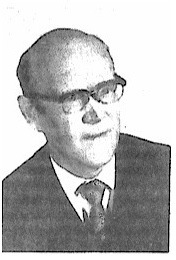
Thies Christophersen
Manfred Roeder, a successful farmer and an attorney, was born in 1929. His father was a dedicated National Socialist, and Roeder himself fought in the battle of Berlin in 1945 as a member of the Hitler Youth.
His initial involvement in politics goes back ten years, when he led a nationwide fight against pornography. Soon after that he became aware of numerous injustices in West Germany. He is the founder of two patriotic organizations: The German Citizens' Initiative and The Liberation Movement of the German Reich.
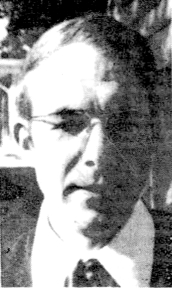
In particular, Roeder has actively refuted the propaganda put forth, by the West German government which seeks to instill a sense of guilt and shame in the German people for the Second World War. Roeder has led mass demonstrations demanding the release of Rudolf Hess, and has been a leading figure in the movement to demolish the hoax that six million Jews were egassed' by the Germans during the war.
Manfred Roeder fled West Germany in 1977 to avoid incarceration on charges of;
gdefaming democracy in general and the West German democracy in particular and unconstitutional propaganda.h
Roeder had received word that once imprisoned, the Bonn regime planned to file many additional charges against him in order to keep him locked up indefinitely.
Roeder has traveled extensively in North and South America since he left Germany, making friends and contacts for his organizations. He is presently being sought not only by the West German police, but by Interpol as well. While in the United States, the F.B.I. was interested in his movements. It is to be hoped that someday Manfred Roeder will be able to return to his farm in Germany where his wife and six children now wait for him. For the time being, however, this man who loves his country and his people must remain in exile from them.
From White Power, Nov.-Dec. 1978
Excerpts from Politische Justiz - die Krankheit unserer Zeit, (Political Justice \ the Disease of Our Time) by Dr Friedrich Grimm, Verlag Bonner Universitäts-Buchdruckerei, Gebr. Scheur, GmbH., Bonn, 1953.
The Disease of Our Time
by Friedrich Grimm
It has become difficult for even well-meaning people to recognize and form an opinion about the true events of history, since the devastating effect of propaganda, which already played its part in the last years of the first World War and afterwards, mislead them.
geI had a remarkable discussion with an important representative of the opposite side in May 1945 a few days after the collapse. He introduced himself to me as a university professor from his country who wished to speak to me about the historical, background of the war. The conversation which followed was on a high level. He broke off abruptly and pointed to the pamphlets on my table, dealing with concentration camp horrors. Pamphlets of this kind we had been inundated with in the first days after the capitulation.
eWhat do you say about that,' he asked me. eOradour and Buchenwald', I replied. eIt would be rather pointless for you to elaborate on this issue as I am a legal man myself and condemn injustice where I meet it, but especially when wrong was done on our side. I am fully aware though of the difference between real facts and the political use which is being made of them. I know what horror propaganda is. Also, I have read all the publications of your experts on this matter after the First World War, the writings of the Northcliffbureau, the book by the French Finance Minister Klotz, From War to Peace, in which he describes how the fairy-tale about the chopped-off childrens' hands was invented and used. Furthermore, I have read the explanatory writings in the periodical, Crapouillot, which compares the horror propaganda of 1870 with that of 1914-18, and finally Ponsonbys' classical book, The Lie in Wartime, which reveals how, already in the last war, depots were in existence where dolls and trick photography were used to compose mountains of corpses. These pictures were distributed with the title left open, which was assigned to them later according to circumstances and then conveyed by telephone through the propaganda centre.'
With that I produced one of those pamphlets allegedly showing mountains of corpses from the concentration camps and showed it to my visitor. He gazed at me rather bewildered. I continued,
eI cannot imagine this poisonous mental weapon, which decided the last war, having been ignored in this war when all of her weapons were so well perfected. Actually, I know that it was not ignored. In the last few months before the collapse I have read the foreign press daily and there I came across these reports about German atrocities compiled by one central office. A certain sequence was followed in dealing with one occupied territory after the of her, today France, tomorrow Norway, then Belgium, Denmark, Holland, Greece, Jugoslavia and Czecho-Slovakia. First there were hundreds of dead in the concentration camps. Then, when six weeks later the same country had its next turn to be reported about, there were suddenly thousands of dead, then ten-thousands and later hundred-thousands. I thought to myself: Surely this numerical inflation cannot possibly go into the millions!'
Now I reached for another pamphlet:
eHere you have the million!'
Now my visitor burst out:
eI can see that I have come across an experienced man. Let me tell you who I am. I am not a university professor. I come from this central office you have just spoken about, where I have been doing, for months, just what you have quite correctly described as making horror propaganda \ and the result was a total victory for us.'
I answered,
eI know, and now you would have to stop!'
He replied,
eNo, we are only just starting now! We shall continue this horror propaganda, we shall increase it, until no-one will accept one word from the Germans anymore. We shall carry on until all sympathies the Germans have had in other countries are destroyed and until the Germans themselves are so confused that they won't know what they are doing in the end!'
Closing the conversation I said,
eIn that case you burden yourself with a great responsibility!'h
This personal account is written for all people of goodwill
I was in Auschwitz from January to December 1944. After the war I heard about the alleged mass murders of Jews and I was quite taken aback. Despite all the testimony submitted and all the reports in the media, I know such atrocities were never committed. I have said so repeatedly, everywhere and at all times, but it has always been useless for no one has wanted to believe me. The evidence, I am told, is unequivocal and confirmed without contradiction.
Court cases have clearly established that gas chambers existed in Auschwitz and the Camp Commander Hoss, has himself said so. Whoever dares to deny this, makes himself suspect of perhaps, having personally participated in the murders of these Jews.
I have been warned to take care because war crimes have not yet come under the Statute of Limitation (as applicable in any civilized nation) and so I can still be tried and be prosecuted and it would be best to keep silent.
Friends and acquaintances have said:
gWhat would you serve were you still to try to correct history?h gYou cannot change a thing!h gAcknowledgement of our guilt has brought us back into the community of nations.h gRemember, you have a familyg. gNo one will believe your reports . . . Keep silent, that's the smartest thing you can do.g
Quite honestly, I began to have doubts myself. When one continually hears the same stories from all sides, it is only reasonable that finally one begins to believe them. gBut what happened to all those Jews if they were not gassed?h I do not know, but I wonder where so many Jews come from if six million of them are supposed to have been killed during the war. In my area of the country there hardly ever were any Jews even before the war. So-called gcattle-Jewsh simply did not exist in rural areas. Spiteful people have remarked that the only reason for this was that the peasants in these northern lands were smarter than the Jews. Very many Jews were able to emigrate before the war, some escaped during the war and many of them have survived the concentration camps c and of course many Jews today live in our midst again.
My doubts were first roused when I read a flyer distributed by Einar Aberg of Norrviken (Sweden). He compared official statistics of the Jewish world population before the war with those after the war. He concluded their numbers had increased to the extent where every woman must have given birth to a child every year of her productive life, if the number of 6 million murdered Jews could be judged to be correct. In 1938 there were supposed to be 15,688,259 Jews in the world. This figure is derived from the gWorld Almanach of the American Jewish Committee. In 1948, according to an article in the New York Times by W. Baldwin, there were supposed to be 18,700,000 Jews in the world. Baldwin is a well-known population expert, entirely neutral, and even the most far-fetched imagination could not describe him as ganti-Semitic.h Thus the story of the 6 million murdered Jews cannot be true, for it is impossible for a nation's population to increase by 50% in just ten years.
The losses of the Jewish people during WW II, certainly regrettable, were not 6 million, but approximately 200,000, according to facts compiled by the UNO, which body surely has no reason to grant special protection to any one nation in particular.
A book published in Brazil contains the following statement:
gc These facts were used by the Canadian Anti-Defamation Committee of Christian Laymen in ascertaining that 200,000 Jews died in the twelve years of Hitler's rule (1933-45), regardless of how they died, i.e. whether they were killed, sentenced and shot as guerillas or saboteurs, or in air raids on camps, or through other circumstances due to war, including sickness and old age.g
The leading Austrian Social Democrat, Dr. Benedikt Kautsky \ himself a Jew \ who spent the years from 1938 to 1945 in concentration camps, three of these in Auschwitz, said:
gI was in the big concentration camps in Germany. I must truthfully state that in no camp have I ever seen anything that might have resembled gas chambers.g
Richard Baer, the last commander at Auschwitz (from 1943) and therefore the most important witness, of whom the Parisian weekly gRivarolh reported that he could not be dissuaded from his insistence that;
hduring all the time he was in Auschwitz, he had never seen gas chambers, nor had he known that any existed.g
Commander Baer died suddenly on June 17th, 1963 whilst being held under investigation, although two weeks previous to this he had been given a clean bill of health.
I never made a secret of my having been at Auschwitz. When asked about the destruction of Jews, I answered that I knew nothing about that. I simply marvelled at how quickly the populace was willing to accept and believe the stories about these mass gassings, without any apparent resistance.
As a result of a war injury in 1940 I developed a severe case of chronic sinus. The slightest cold put me back in hospital. The Autumn of 1942 brought an official medical finding: service on the home front. I filed a request for furlough to attend a higher agricultural school and did so in 1942/43. In the spring of 1943 a commander of Army Headquarters came to our school to solicit agrarians willing to go to the Ukraine to raise india rubber plants. I applied and was accepted.
A mobile war needs vehicles, and vehicles need tires, and tires are made from rubber. Of course there is synthetic rubber, made from carbon, lime and sulphur, called gbuna.h But without the addition of natural India rubber to the mixture, it cannot be produced as there is then no cohesion. The Russians, in their attempt to become self-sufficient (in our case this was called preparation for war), had systematically searched their whole flora for plants that contained India rubber . . . and found some \ among others, one called Kok Sagis, a close relation of the dandelion. The white latex in its roots contains India rubber. This became very important to carrying on the war. The motorized vehicles branch at HQ had organized departments for the cultivation, utilization and research of plants with India rubber content. After a short training period I was sent to the Ukraine to supervise the planting and cultivation of India rubber bearing plants. I had never seen a Kok Sagis plant, but practical work and assistance from some Russian agrarians soon provided the necessary knowledge.
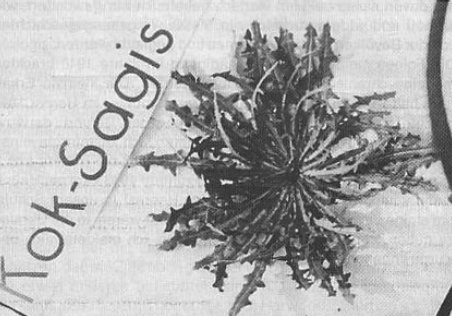
Kok-Sagis \ cultivated in Auschwitz. Found to be high in India rubber content.
In 1943 we lost the Ukraine, and early In 1944 I was transferred to the department of plant cultivation at the Kaiser Wilhelm Institute. This institute had established a branch at Auschwitz, so I went there, and only on my way did I learn, that it was a concentration camp. When relating my experiences at Auschwitz, I have some doubts as to whether I should mention names of former colleagues who today are still alive and with whom I still maintain contact. I know that I myself must be prepared for reprisals for breaking the silence. I am now ready to accept these c and in part already have had to do so.
It was cold and windy when I arrived at the railroad station, of Auschwitz on January 15, 1944. I wondered whether to go by horse and carriage, but decided to walk. Leaving my baggage at the station, I asked my way to the camp. Actually the camp, consisting of barracks, that were ugly but massively built, was very near. The first thing I noticed was the inscription over the gate gARBEIT MACHT FREIg, (gWork will set us Freeg). I was surprised to see so many inmates of the camp walk around unguarded. Later I learned that the camp, surrounded with an electrified barbed wire fence was under guard only at night. There were guards posted outside the grounds, however, who were pulled in at night after roll call.
I reported to my superior, Dr. A., a fine-looking man with steel-blue eyes and reddish hair. He greeted me warmly. I was curious about the camp and asked about the inmates. He said, gThe Germans who are here belong here . . . apart from that it is the European elite that is here.h Later I discovered there was some truth to that statement. I was introduced to his co-workers. There was a former Czarist officer, an exile, who also spoke German and French, and he offered to drive me to my quarters. The officers had no cars but they did have a carriage and a driver at their disposal to travel on the extensive lands that were under cultivation. However, I found this somewhat pompous. I also found it embarrassing, that inmates whom we passed on the way, took off their caps and stood at attention as we went by, but we were officers and the SS-men also gave us the military salute.
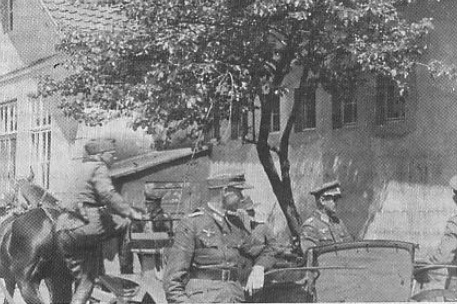
Author (centre) with arm resting on horse-drawn buggy, used by officers for conveyance around the camp grounds.
My quarters were in Raisko, about 3 km from the main camp. This was where a women's camp, the botany buildings with their hot houses, and the laboratories for our research work were located. I was given a room in an unattached dwelling; I shared the house with a colleague who was the supervisor of the department of plant cultivation. He was a man with a happy disposition. There was something heart warming about his laughter and he was well liked by the inmates and he still corresponds with some of them today. Later on he had his wife and two young children join him.
I then moved to an apartment in a botanic building that had just been completed. This I shared with a scientist whose name I can mention; it was Dr. Boehme. He was shot and killed by Polish civilians who went wild after the capitulation. He had never harmed anyone and had been kindness and courtesy personified.
The first inmate I met was gAgnes.h She was a member of the Jehovah's Witnesses and was our cleaning lady. I questioned her about conditions at the camp but she would not speak about them. Not so Mrs. Pohl who was in control of the kitchen. She also was a student of the Bible and made up flyers which she distributed to the inmates. Actually, this was against the regulations, but it wasn't my job to watch the inmates. Apart from that, her publications seemed harmless to me, and I had always been tolerant in matters of religion. Even now I cannot deny Jehovah's Witnesses a certain measure of respect, for they were willing to have themselves locked up and suffer for their faith simply because they wanted to suffer. There was no need to watch them and they were free to move even beyond the line of posted guards.
In our camp about 300 women were housed in three barracks. They were made up of a select type of worker who worked almost exclusively for the department of plants. For the most part they were Jewish and Polish with a sprinkling of French. All spoke German quite well and many had an academic degree. Their work was of a scientific nature and they were quite self-sufficient. In fact, it was not I who was training the inmates, they were training me, and they did so with a certain pride, in fact, I might almost say, with an air of self-importance. At any rate, I had the impression that the inmates performed their research tasks gladly and with enthusiasm.
The cultivation of plants proceeded on a basis of selectivity. The roots of the plants were examined as to their India rubber content and reproduced through seedlings. Their seeds were carefully gathered and re-sown. Sabotage could easily have been committed but we never learned of even a single instance. It must be mentioned, however, that the inmates did not trust each other. There was that ancient feeling of hate between Jews and Poles. Compared to this hate, so-called National Socialist hatred of the Jews was quite harmless.
The results in increased India rubber production were quite satisfactory. One of our superiors went to Russia, and returned with a number of scientists. They came with their families and worked for us as civilians, enjoying their work.
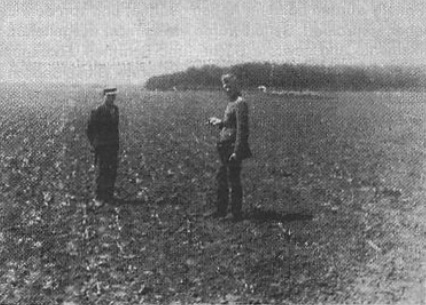
Russian agronomist (on left) and the author.
A sort of drama developed with the arrival of one Russian agronomist, J. Sassmoshek. He found a former sweetheart among the inmates and this re-union had its natural effects. Sassmoshek married the woman and she was released from her internment. After the evacuation from Auschwitz, I saw them again at Halle and both were radiantly happy. I myself was not so happy at the time, I had just been through that terrible air raid of February 13th on Dresden, which had been declared an open, undefended city, and from which I had escaped unharmed, as if by some miracle. I believe on this one day in Dresden more people died than had supposedly died in Auschwitz throughout all the years of the war. But the war crimes of the Allies are not debatable, even to this day.
Just what was the daily routine at Auschwitz? Rising at 7 a.m.. washing, showering, breakfast and roll call, on the job at 8. Lunch from 12-1, and work again until 5 p.m. Roll call once more at 7 p.m., following which the guards posted outside the camp were pulled in and the camp put under guard. Mail was delivered daily. Packages were opened at roll call and examined by the camp supervisor. Only rarely had some of the contents to be withheld, such as for instance, certain medical preparations, books and pamphlets cameras, radios and technical instruments. These things, however, remained the property of the inmates and were stored in a huge warehouse called gKanadag, where also all possessions of Jews interned at Auschwitz, were kept.
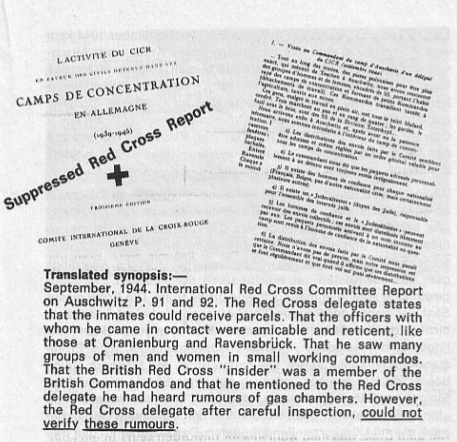
Translated synopsis: \
September, 1944. International Red Cross Committee Report on Auschwitz P. 91 and 92. The Red Cross Delegate states that the inmates could receive parcels.
That the officers with whom he came in contact were amicable and reticent, like those at Oranienburg and Ravensbruck. That he saw many groups of men and women in small working commandos. That the British Red Cross gInsiderh was a member of the British Commandos and that he mentioned to the Red Cross delegate he had heard rumours of gas chambers. However, the Red Cross delegate after careful inspection, could not verify these rumours.
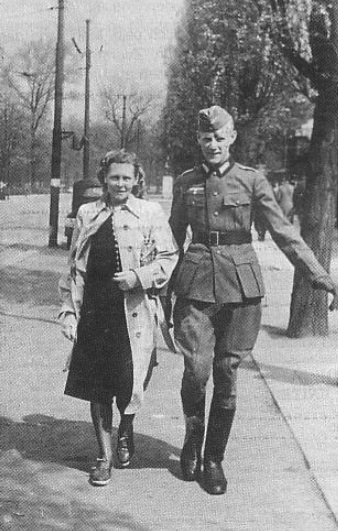
Author and wife on leave in the East. 1944.
gKanadah was kept under guard at all times to prevent looting from the outside. In our weather station we had a female SS-worker who, on one occasion, gorganizedh a pair of stockings for herself from gKanadag. She was court-martialled for gplunderingg. However, the inmates themselves, who worked there, stole constantly.
Surprising to me was the elegance of the inmates' wearing apparel. Their outer garments did, of course, consist of uniforms, but all other apparel, including shoes, was of the finest quality, nor was there any lack in beauty care, and make-up was all part of the female dress. Every Saturday our women were sent to the main camp for an exchange of laundry and they brought back alluring bits of booty, which were then distributed among the inmates. It was a type of theft that I think was being quietly tolerated.
In May my wife, for the first time, came to visit me. She was a teacher in agricultural home economics and was curious about my work at the concentration camp. This fact alone, that we were able to have our relatives visit us at any time, should prove that the camp administration had nothing to hide. Had Auschwitz been the death factory it is reputed to have been, such visits would certainly not have been permitted. Formalities, such as even today are required for a visit to that prison camp, otherwise known as East Germany, were not required at Auschwitz. We were a young married couple and had not seen too much of each other in our marriage. I met my wife at the railway station. She wore wooden sandals without stockings and a kerchief over her hair. It was war time and elegance was a luxury we could not afford.
At that time 1 had a new cleaning lady \ personal maid would have been a more fitting title. Olga! Olga was Polish. She was a factotum. But there was something touching about the solicitous care with which she took my affairs in hand. There were always flowers in my room; always a clean table cloth and clean curtains, and somehow she always managed to have a surprise for me.
She had taken special pains in getting my room ready for my wife's visit. Above my bed she had attached a praying angel to the wall \ Lord only knows where she got that! Actually, her care was a bit overpowering, but I had to accept since I didn't want to hurt the concerned soul that she was.
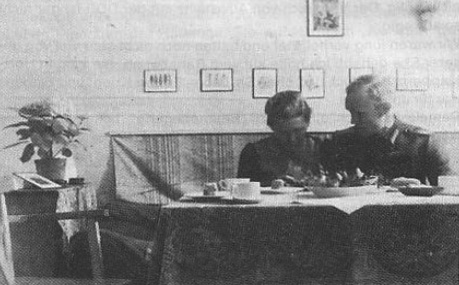
Author on gsecond honeymoon,h celebrated in camp, with table-setting lovingly prepared by Olga.
During my wife's visit, work was commenced on the india rubber fields and I did not have too much time for my visitor, but she had the best possible companion in Olga, who could talk like a waterfall. My wife felt she should compensate Olga for her thoughtfulness and bought her a small gift. The result was that when I took my wife to the railway station for her trip back home, I hardly recognized her. She was dressed in new clothes from head to toe. Olga had gobtainedh everything for her, even a brand new suitcase. My wife had brought me a few delicate morsels saved from her own meager rations, among other things, a piece of butter. Olga managed to make fried potatoes for me evenings and strangely enough there was no end to the butter. Care packages arrived daily and Olga felt duty-bound to include me in the distribution of this bounty. The inmates at Raisko never went hungry, and any new arrival looking somewhat undernourished, after only a few days seemed to have a gsmooth fur.h
gThe death camp was not in Auschwitz, it was at Birkenau.h This is what I heard and read after the war. Well. I was also in Birkenau. This camp I did not like. It was overcrowded and the people there did not make a good impression on me. Everything looked neglected and grubby. I also saw families with children. It hurt to see them, but I was told that the authorities felt it kinder not to separate children from their parents when the latter were interned. Some children played ball merrily enough. Still, I felt children did not belong there and the fact that the English had done likewise \ in the Boer War, for instance, was a poor excuse, I said so to my superior. His answer: gI agree with you, but I can't change it.g
I had been commissoned to pick 100 workers for hoeing the Kok-Sagis plants. At roll call the inmates were asked if they were interested in this kind of work and if they had done it before. Then followed the gselectionh of the workers. This gselectionh was later completely misinterpreted. The purpose was to give the inmates something to do and they themselves wanted to be occupied. Selecting them meant no more than to inquire about their inclinations, their capabilities, and their physical state of health with regard to the work they were to do.
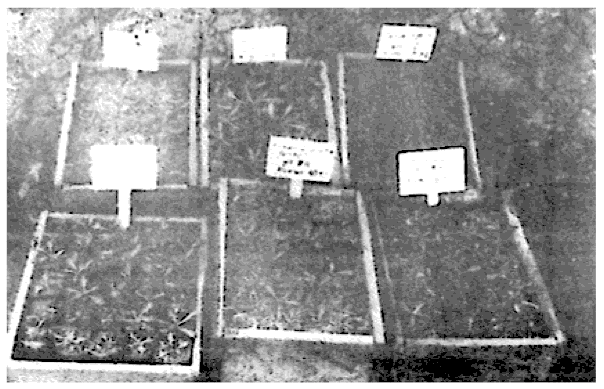
Kok-Sagis plants in various stages of development.
The fact was, however, that in Auschwitz there were more people than were jobs. Naturally, I was concerned with getting workers who had experience on farms. Jews, of course, were not experienced for any kind of farm work, whilst on the other had, Poles were excellent farm workers. Gypsies were entirely useless. Detachment 11 \ that was the name of our female workers from Birkenau \ came every day to work in the fields that lay beyond the outer line of posted guards. I dealt with these people almost daily and listened to their complaints. On one occasion I saw an SS guard kick a woman. I confronted him about this.
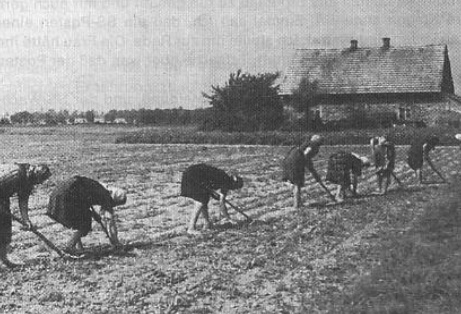
Women inmates working Kol-Sagis fields.
Note absence of guards and standard attire of women.
He claimed that the woman had called him a Nazi pig, but the fact was that he had first insulted her. I reported this case and the SS-guard was sent to gStrafbataillonh in Danzig. From this day on, my favor with the inmates rose significantly, especially with those in Detachment 11. They often came to me with requests or complaints and I did whatever I could for them, because to me they were not enemies, they were simply interned. Often, I did favours for them that were against the regulations. Their greatest joy was for me to take them for a walk down to the river Sula, where on those hot summer days of 1944 I allowed them to go bathing.
Apart from all else, the hoeing-detachment from Birkenau was a merry bunch. They sang their Polish folk songs while working and the gypsies danced to the melodies. In the beginning, I was quite upset and worried about the undernourished appearance of some of the inmates. Then I learned that they had arrived in rather poor physical shape and it took some time before they had padded themselves with some extra poundage. Often I shared their common noonday meals and fared well doing so.
But Detachment 11 also had a secret supply source. The most wonderful things were found by them in unknown hiding places. In the night these were replenished by friends of the inmates. Sometimes these friends even donned inmate attire and marched into the camp, allowing an inmate to take a few days off. Auschwitz was located in Poland and the population helped the inmates as much as possible, though this was officially not permitted.
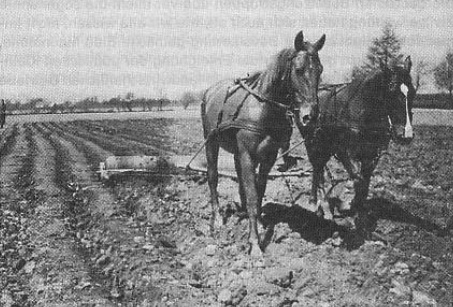
Inmate working in fields (almost hidden by horses).
Note only one single guard at great distance, in far left of photograph.
The occupation troops, but especially the so-called civil administration, often roused the antagonism of the population, as was well-known. One measure I decidedly disapproved of was the expropriation of land from small farmers. They had to give it up for agricultural use by the concentration camp. I was told, however, that they were compensated for their property on the same basis as land expropriated from Germans for the construction of autobahns. I also did not like the re-settlement measures that were carried out, but I was told repeatedly that these were never forced on anyone. Curtailment of freedom is hard, but war is tough and it became increasingly tougher for us too. In the fall of 1944, for the first time, the camp at Auschwitz was bombed by American planes. There were about 20 victims among the inmates. I myself had lost faith in victory after the successful landing at the English Channel. Reports from the front became more and more ominous, and the inmates too were well informed \ the devil knows through whom.
In our area the inmates were looked after now just as well as they had been before. Once a week a film was shown. Camp supervisors and inmates jointly saw, among others, the film gMuenchhausenh and the gGolden City.h Church services were held in community halls. I attended several myself and found them to be quite solemn, especially those of the Russian Orthodox Community, to which our Russian civilian workers also belonged. A theater group had been organized by the inmates and one evening they invited us to a performance of gFaust.h Professional actors could not have produced a better show.
As for myself, I would have liked to take some more time off for studies but the war situation was serious and chances were poor. It was suggested that I take a correspondence course, and I sent away for books. An inmate, a Jewish female doctor from Prague offered to help me cram, and she did so every afternoon. This was possible in Raisko.
The Jews were intelligent and so far as I got to know them in Auschwitz, quite nice too. In the summer my mother came for a visit and stayed several days. Of course, a fat friendship developed between her and Olga. One. evening my mother asked about the crematorium where corpses were supposed to be burned. I knew nothing about this, so I asked Olga. She could not tell me anything definite either. She did intimate, however, that around Bielitz there always was what seemed to be a reflection against the sky, as if from a fire.
So I went in the direction of Bielitz and there found a mining camp in which some inmates also worked. I travelled around the entire camp and examined all fire grates and all smoke stacks, but found nothing. I asked my colleagues; the answer c a shrug of the shoulder and gdon't pay any attention to those rumors.h Actually, there was a crematorium in Auschwitz, I was told, for there were 20,000 people there and any city of that size has a crematorium. Of course people died here as they did elsewhere, but not only inmates at the camp. The wife of one of our supervisors had also died here. As far as I was concerned, that was enough of an answer.
During all the time I was in Auschwitz I never in the least observed anything that even indicated mass killings in gas chambers. Also the story of a smell of burned flesh that allegedly hovered over the camp at times was an infamous lie. In the vicinity of the main camp there was a smithy where horses' hooves were shod. The burning of the horses' hooves when fitting them with shoes naturally caused an unpleasant smell. Incidentally, the man who was in charge of this particular smithy at the time, now lives in a neighboring village.
As a matter of fact, camp regulations became more generous all the time. In the main camp there was now a brothel for the men. Love and sex, is something human after all, and was not withheld from those who were interned. Of course there were also love relationships among the inmates. I doubt that the so-called ghouse of pleasureh was a deterrent. The fact that such houses did exist for the inmates in Auschwitz was completely ignored in all post-war reports. An admission to such a brothel was a kind of reward for good behaviour. There were also some inmates who flung their ticket into the Kapo's face. Hats off to them, I say, for that to me was a special show of good behaviour. Olga loved to constantly chatter and her continual gossiping, rumouring and wondering as to whether or not corpses were being burned (whilst I knew for sure there was no such happening) finally got on my nerves. This, plus her almost slavish servitude, brought us to a parting of the ways. She was given a new job, one I did not begrudge her. She was made goverseerh in the women's camp and it was her job to keep out men who had no business there. Olga had a gift for graising hellh and could scold so beautifully that it was a joy to see her eject males from the female camp. Her fellow inmates called her gZerberusg, (hound of hell).
Good old Olga, sometimes I wonder what became of her. She didn't want to return to a Communist Poland \ almost none of the inmates wanted that, not even the Jews. Many of them even prayed for a German victory. From a colleague, whom I visited recently, I learned that quite a number of them are in the U.S. He still corresponds with some. Some were also willing to testify on behalf of SS Officers at their trials but were denied this privilege by Allied and especially by West German authorities. These reports were publicized by the gright wingh press at the time.
There were no secrets in Auschwitz. In September 1944 a Commission of the Red Cross came to inspect the camp, but it was more interested in the camp at Birkenau.
Publishers note:\ Having read the 156-page Report put out by the International Red Cross, it seems strange that Auschwitz, one of the largest camps of its kind and much publicized as being a gdeath camp,h should warrant only a few paragraphs in the Red Cross reporting, and this would seem to add verity to the statements of Thies Christophersen.
We also had a great many inspections at Raisko, but the people who came were largely interested in plant cultivation. I was often involved in these tours. Although it was actually not permitted that inmates converse with visitors, they did explain their work to them.
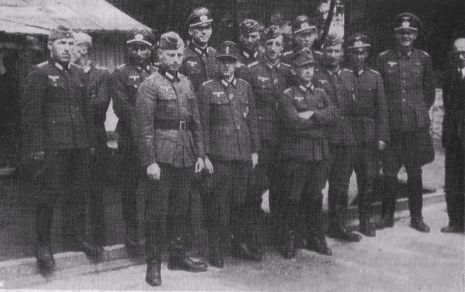
Visiting delegation
At the time we experimented with colchezin. This is a poison of the Autumn Crocus (colchium autumnale). With the aid of this poison we developed a plant with twice its number of chromosomes. Such plants tended to grow into giants, but at the cost of fertility. The collection of plant seed therefore still played an important role, but the harvesting of the seed was not exactly simple, because the reproduction device of this plant was similar to that of the dandelion. With the aid of some talented mechanics and Russian agronomists, i had begun to construct a harvesting machine. Some Russian agronomists worked with a so-called glongalvanizationh method. For this purpose, the inmates built tools that worked with ultra short waves. The material for these I picked up at a shop where planes that had been brought down were dismembered. The inmates also found material there with which they could build small radios. These of course they could not take into the camp. I myself learned to build radios at Auschwitz. My teachers were the inmates and they supplied me with everything I needed for a small receiving set.
At Auschwitz we did not of course only cultivate plants. Innumerable research tasks were carried out. Because of the availability of workers there, more and more research work was being delegated to Auschwitz. At that time the place was also fairly safe from air attacks. About every two weeks the SS officers met for a casino night. On these occasions, department leaders spoke about their particular field of work. I heard many interesting lectures there and I do not recall anything that might have been offensive. Later on I heard that experiments were supposed to have been carried out on living human beings. I remember having listened to a lecture on the development of the embryo in the womb of the mother under various kinds of diet. Whether these women had to carry and give birth to a child while subjected, to starvation diets, I cannot say. We were told, however, that these experiments produced valuable insights into the dietary care of pregnancies. Reports on experiments of newly developed medicines carried out on inmates do not appear plausible to me. A medical doctor at Auschwitz told me that new medicines were given to people only when experiments on animals were concluded. This practise is still carried on in all civilized countries.
After the war I saw a TV film about Auschwitz that showed a building with huge smoke stacks. I am very sorry, but when I left the camp at Auschwitz in December 1944, I did not see this building. I cannot imagine that these smoke stacks were built in the cold winter of 1944/45, but 1 suspect that these structures were erected after the war. It also seems implausible that, if they should have existed, the SS did not destroy them. During the past few days I have heard a report on the radio according to which 4 million people are supposed to have been shot at Auschwitz. It is an absolute certainty that no people were shot at Auschwitz, because this we would have heard. I do, however, recall one occasion when there was great excitement in the camp. A rumour was being spread that hostages were to be shot. This type of revenge is the most despicable I can think of because it hits innocent people. That it did take place \ on either side \ is quite likely. If for every bombing victim an inmate should have been killed, none of the 200,000 inmates would have left a concentration camp alive. On this basis, considering that Auschwitz was in operation only four years, one million people a year or 3,000 per day would have had to die. Just what would a crematorium look like in which 3,000 corpses were burned every day? Even mass graves on this order could not be kept secret.
Yet the German people continue to believe in these mass murders. Why? We who know the truth, have we not burdened ourselves with an awful responsibility? Why did we keep silent for so long? I shall try to answer these questions.
What changes will take place when the disclosure of my own personal experience is made public? Most likely none. Some sort of decree may be issued against me and an attempt might be made to confiscate this pamphlet.
Our people, especially our children, must be freed from the feeling of guilt being forced upon them by the victors of the last war \ and it is only the truth that will make them free.
I have recorded the memories of my experiences as I recall them. I have stated the truth, so help me God. If these my statements contribute to our youth having more respect for their fathers, who as soldiers fought for Germany, and who were definitely not criminals, then I shall be very happy.
Kaelberhagen, January 3, 1973.
2341 Mohrkirch/Kalberhagen. Tel. (0 48 46) 8 88.
The publication of AUSCHWITZ (Die Auschwitz-Luege) in March 1973 hit the pseudo-democratic establishment like a bombshell. For almost 30 years the world has been flooded with the official version of so-called eNazi atrocities.e All documents and reports of a different truth had been destroyed or suppressed, all witnesses who dared to give the real story were hanged, imprisoned or intimidated so that the Inquisition of the 15th century looked pale in comparison. All historians who dared to publish different facts, came under attack or ridicule and usually lost their contracts for teaching at universities.
Some were even murdered.
The general public therefore had hardly any access to truthful information and \ to a large extent \ began to believe that the Germans were brutal monsters who had gassed six million innocent Jews, simply because they were Jews, all of them, of course, nice and good-natured people, the crown of humanity. According to general belief, no Jew was ever killed legally for being a criminal or executed rightfully under martial-law. The death of a Jew is always an illegal act \ no questions or doubts allowed.
Manfred Roeder, himself having gone through all the methods of re-education, believed for many years that six million Jews had been killed or gassed. He, like so many others, believed that concentration camps were extermination camps. Until he met Thies Christophersen, who told him the real story from his own experience.
Christophersen is one of the very few unbiased witnesses who has no ax to grind. He was neither a guard at Auschwitz who may have reason to hide something, nor was he a prisoner who may be inclined to exaggerate his sufferings. Christophersen was a totally neutral person. He had to work with the inmates of the camp, but had no executive power over them nor the right to guard or punish them.
His report is so simple and convincing, so un-dramatic, so contrary to everything anybody has heard about Auschwitz, that it puts to shame all other ewitnesses' and especially the judges who based their judgments on those dramatic stories of eprofessional witnesses' even if these stories had to be changed seven times before the court!
The publication of this report with the introduction by a lawyer caused a sensation. This was incredible! After 30 years the whole edifice of lies and distortions began to crack. There was an outcry of madness by the Jews. In Tel Aviv the Jewish papers attacked this book as ferociously as they did in all the Western countries. The Jewish Weekly in West Germany dedicated a front page article by chief editor Galinski under the banner headline eLiars at Work,' and he called Christophersen and Roeder the two biggest liars since Goebbels. A flattering compliment because Goebbels was probably the greatest genius of propaganda that ever lived \ and his propaganda was based on facts, not lies!
Simon Wiesenthal urged the courts and the bar association to take eproper action.'
gEspecially in Mr. Roeder's preface there are remarks worthwhile investigating.g
At first, court and bar association refused to do anything. But under growing pressure, finally Roeder was disbarred for his eimproper radical political views and actions,e and another court in Darmstadt sentenced him to seven months imprisonment as well as a $2,000 fine plus court and lawyer costs. Only Roeder was taken to court for his introduction, not Christophersen for his report, because \ as the judge sneeringly said to Mr. Roeder \
gWe have freedom of speech, and anybody can write as he pleases, but your interpretation of Christophersen's report sounds anti-semitic, and for this criminal attitude you are punished.g
The court found Roeder guilty of ewillfully inciting race hatred against a minoritye (the Jews). Denying the existence of gas chambers may include the assumption that all Jews, who have testified to the contrary, are liars. (Which indeed it does!) The merits of the case contain the following statement:
gEven if there had been no extermination program and no persecution of Jews at all (which means that all Jews are liars), it is anti-Semitism to suggest that the Jews are lying, because it would stir up racial hatred! It would endanger the public peace!g
The Supreme Court of West Germany declared this sentence to be invalid, not because it was ridiculous, arbitrary and contradicting any logic, but because it was too lenient. Another lower court was directed to re-try Mr. Roeder and to increase the punishment to several years, at least, because;
ga responsible citizen like a lawyer cannot neglect the well-established facts of recent history. Otherwise he would prove his ill-will against a minority and his criminal intentions.g
Mr. Roeder is now living in exile since January 1978. Literally dozens of similar echargese by kangaroo courts are pending. If he returned to Germany under the present political system and occupation regime he would be immediately arrested and put in jail for edefaming democracy' (as Plato has done) or for eunconstitutional propaganda.e By demanding the re-unification of Germany and the withdrawal of all occupation forces, Roeder has become the most ardent regime critic of pseudo-democracy, which he calls mobocracy. For his ethought-crimes,e as described in the classic study of tyranny by George Orwell in 1984, he is now persecuted by Interpol, and several warrants of arrest have been issued.
AUSCHWITZ has become a secret best-seller with youngsters in Germany, as well as the eproof of dangerous neo-Nazi activity,e which has to be wiped out once and for all. There is hardly any other book that has caused such public controversy and uproar.
JÜDISCHE WQCHENZEITUNG
PREIS 80 PEFNNIG
XXVIII. JAHRGANG \ NUMMER 28 DÜSSELDORF, DEN 13. JULI 1973
Lügner am Werk
Von Heinz Galinski
Reprinted from the Jewish Weekly of West Germany of July 13, 1973, with the banner headline:
The article by the chief editor points out that this book (The Auschwitz-Lie) is setting a new record by denying the gas chambers, for no one has dared to lie in such a blatant way since 1945. The authors are obvioulsy following the concept of Hitler and Goebbels. He then quotes extensively from the book and concludes:
gThis is typical distorted National Socialist propaganda for which there is no room in our democracy and in our constitution. We demand immediate and proper court action against the authors of this book. It would be a serious fault to regard this poisonous pamphlet as unimportant. With this publication the German reactionaries are testing how far they can go in glorifying the Third Reich. Our democratic state must give them the proper answer.h
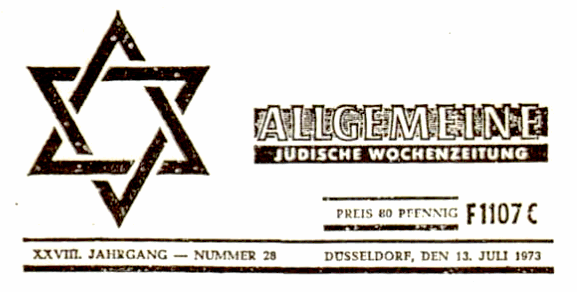
DOKUMENTATIONSZENTRUM
DES BUNDES
JÜDISCHER VERFOLGTER DES NAZI-REGIMES
An den Präsidenten der Rechtsanwaltskammer.
Zeil 29 (Pres. of the Bar Association)
D-6000 Frankfurt/Main Wien, 10.5.1973/SW/da
Dear Mr President:
Enclosed with this letter you will find a brochure called gThe Auschwitz Lieh, issued by the gGerman Citizens Initiativeh (Deutsche Buergerinitiative), represented by attorney Manfred Roeder, 614-Bensheim, Roonstrasse 8. We assume that he is a member of your bar association.
Apart from the fact that this brochure contains malicious and long disproved statements about the concentration camp Auschwitz and the sufferings of the Jews. there are in Mr Roeder's preface remarks which are worthwhile investigating by the ethics committee of your bar association.
Would you please read this brochure and especially Mr Roeder's preface, and then make your decisions. In any event, I would appreciate hearing from you.
Very truly yours
signed: Simon Wiesenthal
Dear Mr Wiesenthal: 30. May 1973
The Bar Association in Frankfurt forwarded to me your letter of May 10 in connection with the brochure gThe Auschwitz Lieh. It is my desire to reply to you personally.
Are you concerned that a German lawyer does not conform to your new Re-Education Program which was laid down as a rule and guide by your people, and who instead tries to find eyewitnesses and authentic documentation on his own to support the alleged concentration camp atrocities? Your concern is well justified since I had to swear an oath when I was sworn in as an attorney on January 27, 1967,
gto preserve the constitutional order, by God the All-knowing and Almighty, and to fulfill the duties of a lawyer faithfully, so help me Godh.
With that oath I did not obligate myself to respect that version of eTruth' which is authorized or desired by Mr Wiesenthal and his Documentation Center, or to recognize the etruth sanctioned in Nuernberg'. Neither am I aware of my colleagues having sworn any additional oaths to this effect.
I was all the more left to my own resources in finding witnesses since your eDocumentation Center' does not seem to be blessed with plenty of documents. As it was. when I made an urgent request to you for documentary material about the alleged murder of Jews, you did not offer me one single piece. Instead, you referred me to some obscure statistics which were of Jewish origin at that.
Since when are statistics proof of murder? According to German law, there has to be an unbroken chain of evidence that a certain human being has murdered someone else, before any accusation can be made or a conviction can be had. But you do not even bother to give the names of the alleged victims, not to speak of the circumstances of their death. You merely compare figures of the Jewish population before and after the war as proof of murder. It would be a similar hypocrisy if I were to say that every human being coming up missing after the war had been killed by the Jews out of revenge. You know only too well what would happen to me in such a case. But you can continue to claim, unchallenged, that every Jew who is missing according to YOUR statistics, was gassed and burnt by the barbaric Germans. You, as a certified engineer, should realize the error of such claims from a technical point of view.
There would not have been enough fuel to be found during the war in the entire sphere of German influence to burn just a fraction of so many human bodies. Nowhere have mountains of ashes been found, of course. And the huge installations necessary for such an undertaking, have disappeared from the face of the earth without a trace. Nothing, absolutely nothing could be found after the war. It might interest you that I know enough eyewitnesses now who were in Auschwitz after the war who confirm all of the observations made by Mr Christophersen:
there have never been such extermination installations! But these witnesses fear reprisals by the Poles and certain Jewish organizations, should they come out in the open with the truth. I can only afford to speak out openly as I am freelancing in my profession. You are now trying to exert pressure through the bar association to insure that lawyers in the future will follow only gyour sources of truthh. Perhaps you have over-estimated the degree of influence of German lawyers just a little.
I am nevertheless grateful for your very enlightening letter. It is the best document from your center in my possession. It proves after all, that you maintain a tight network of information and espionage over all of Germany. Otherwise it would be inexplicable how you could have obtained a copy of the Auschwitz brochure, which, so far, has been handed only to a very select circle of people and has not been offered or sold publicly. I cannot imagine that you count yourself amongst the friends of the German Citizens Initiative.
Naturally, I hope for the widest circulation of this brochure and would be very grateful to you if you would distribute some of them among your Jewish friends. As l mentioned in the Preface, I am convinced that this brochure only serves the purpose of finding the truth and every decent Jew will welcome it. Only a fool or war monger could desire to have this horror propaganda against Germany continued.
Your letter was remarkable in yet another aspect as well: One gets the impression as though you might be the secret gGauleiterh of Germany or an agent of some world organization to control and censor public opinion. Who authorized you anyway to watch over the professional activities of German lawyers, and to make suggestions to the bar association?
We German lawyers do not appreciate a Jewish or any other form of censorship and domination. Before you snoop around any further in our affairs, maybe it would be more advisable for you to respond to the accusations made by Polish newspapers claiming that you had been a Gestapo agent, lest your hectic Anti-German activities appear to be of the gHold-the-Thief' kind.
A copy of this letter will be mailed to the bar association. Because of the importance of the matter, I shall publicize our correspondence.
Very truly yours,
signed: Manfred Roeder, Attorney
================ END OF BOOKLET ================
| Original German version of scanned document (PDF). Click to view or download. (2.0 MB): Christophersen Thies: Die Auschwitz Lüge (1978) | 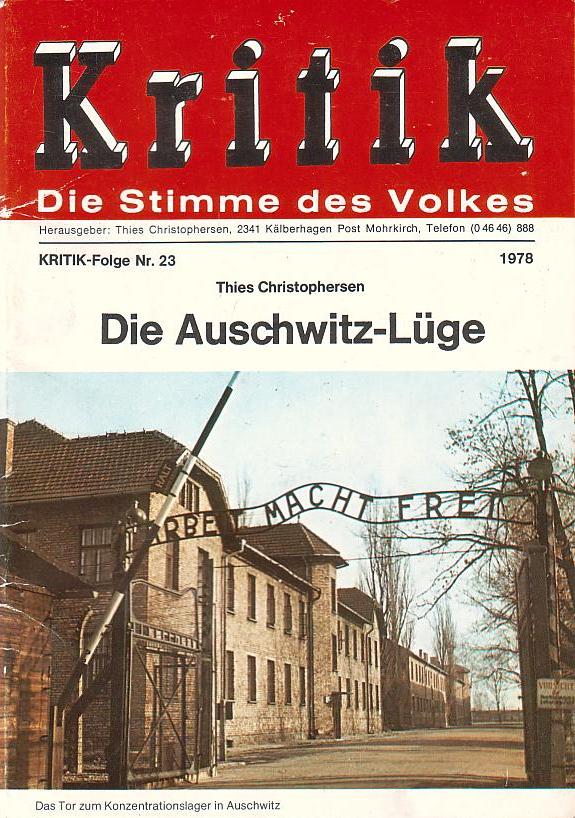 |
| Original English version of scanned booklet (PDF). (5.1 MB): Thies Christophersen, AUSCHWITZ: A Personal Account | 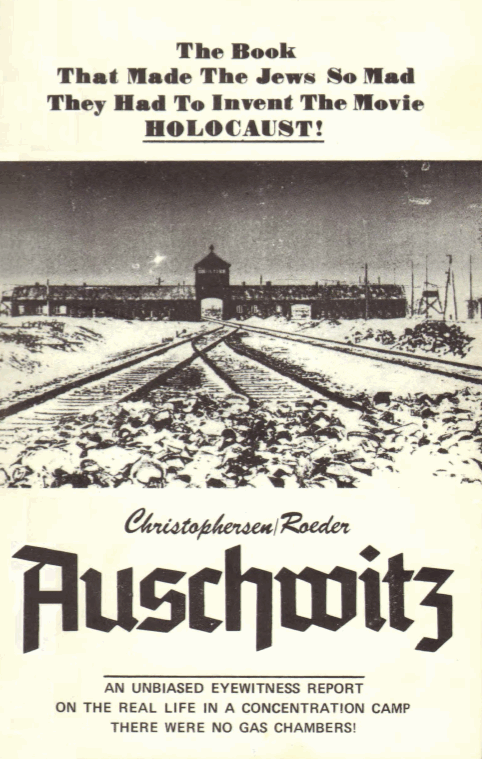 |
| PDF of this blog post (clean text and images). Click to view or download (1.6 MB): Thies Christophersen, AUSCHWITZ: A Personal Account (Version 2) | 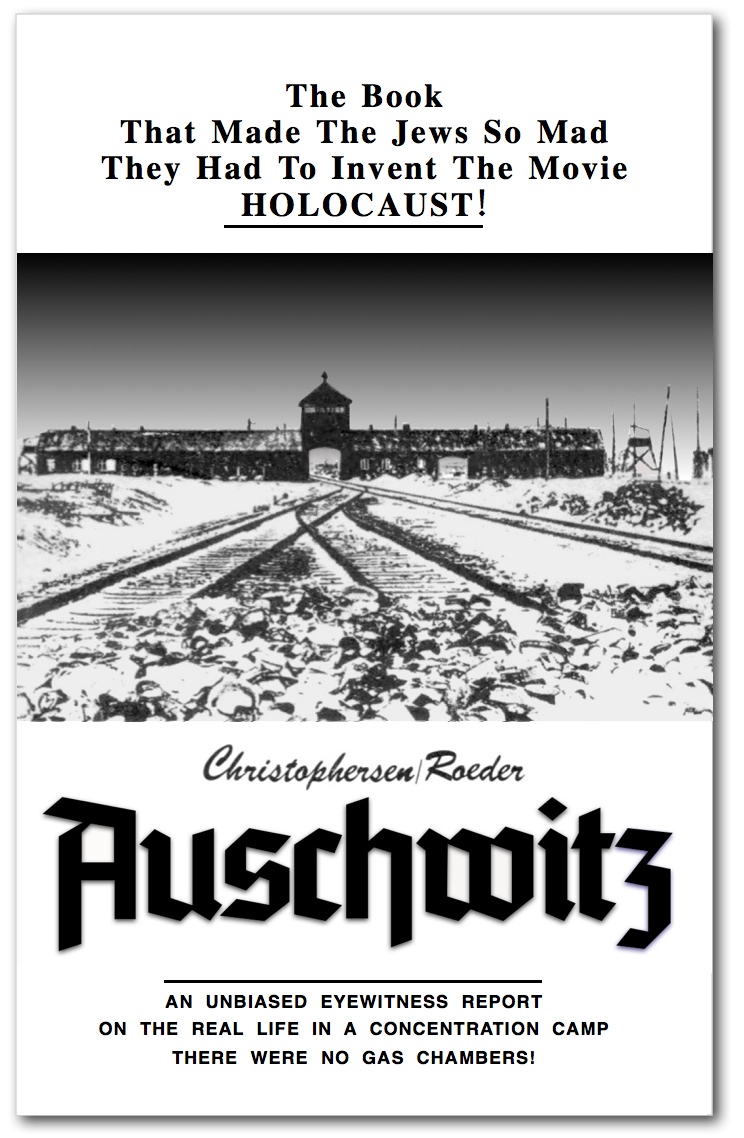 |
| Property | Value |
|---|---|
| Author(s): | Thies Christophersen |
| Title: | Auschwitz: A Personal Account |
| Sources: | Thies Christophersen, Die Auschwitz Lüge, self-published, 1973; revised 1978; English translation: The Auschwitz Lie, 1974 (with various reprints and new editions under various titles) |
| Published: | 1973-01-01 |
| First posted on CODOH: | Dec. 15, 2015, 5:35 a.m. |
| Appears In: |